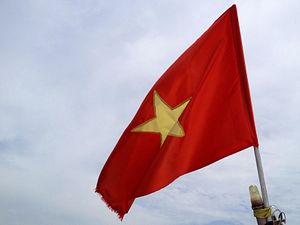Approaching the third anniversary of the tribunal ruling in the Philippines’ favour against China over maritime entitlements in the South China Sea, it became clear that Beijing was no closer to adhering to the international court’s binding award.
Instead, China continued to demonstrate its disregard for the landmark July 2016 ruling by the Permanent Court of Arbitration in The Hague, and for the United Nations Convention on the Law of the Sea (UNCLOS). Beijing’s quest to establish a new status quo in the disputed waters of the South China Sea continues.
The stand-off between Vietnam and China over ongoing geological survey work by a Chinese vessel and its escorts – including a massive China Coast Guard vessel – highlights the new realities taking shape.
Hanoi and Beijing are no stranger to these sorts of stand-offs. In 2014, China-Vietnam relations hit a nadir over Chinese state-owned China National Offshore Oil moving its Hai Yang Shi You 981 oil platform into disputed waters.
In 2017, Chinese pressure on Vietnam, including a threat to use force, resulted in the suspension of an offshore natural gas project by Spanish firm Repsol in the southeast of Vietnam’s claimed exclusive economic zone, which China also claims.
This time, however, Chinese vessels are not only conducting energy survey work in disputed waters but actively coercing neighbouring claimant states away from contested probable hydrocarbon resources.
The presence of Haijing 3901 – one of the world’s largest coastguard vessels – underscores Beijing’s continued use of maritime law enforcement vessels in disputed waters to emphasise its claims.
Vietnamese coastguard vessels have been monitoring developments. Hanoi’s decision to go public with its claims about the activities of the Chinese survey ship Haiyang Dizhi 8 has raised the profile of the long-running stand-off but done little to push back the Chinese ships.
Despite the 2016 Hague tribunal’s finding that China’s claimed “historical rights” based on the “nine-dash line” – derived from a 1947 Chinese map – had no validity under international maritime law, Beijing’s recent actions have emphasised its determination to uphold its claims.
Through this month’s first test of anti-ship ballistic missiles in the South China Sea and the continued inhibition of other claimant states’ access to resources on their continental shelves, China continues to challenge the status quo.
International law is generally the best tool that weaker states have in protecting their rights and claims. By continuing to flout UNCLOS, Beijing shows Southeast Asian claimant states its preference for a “might makes right” world, in which larger powers dominate.
Beyond the international legal concerns at play, China and Southeast Asian states need to work towards a realistic way to equitably share and enjoy the energy bounties that may lie under the South China Sea.
Although estimates of these resources are indeterminate and largely unproven, Beijing and Southeast Asian littoral states are competing in a high-stakes game. To arrive at a more economically just resource-sharing mechanism, all states including China need to refrain from pushing dubious entitlements.
The tragedy of the South China Sea, as shown by China’s disregard for Vietnamese sovereignty, is that tensions will remain high enough to prevent an atmosphere in which all claimant states might begin that process and jointly exploit these resources in a managed way.
As long as China continues to employ forward-leaning, coercive tactics, weaker states will have little recourse. The latest crisis is a reminder of how Chinese dominance, when it shows little regard for international law, leaves the region worse off.
This article first appeared in the South China Morning Post. It is republished here with kind permission.

































